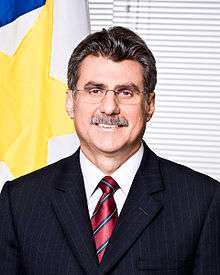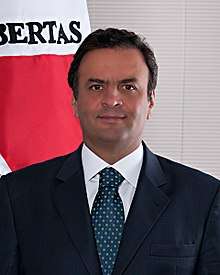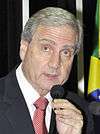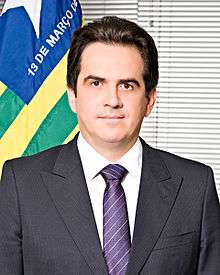Brazilian municipal elections, 2016
|
| |||||||||||||||||||||||||||||||||||||||||||||||||||||
| |||||||||||||||||||||||||||||||||||||||||||||||||||||
Mayors and councillors of all the 5,568 municipalities of Brazil | |||||||||||||||||||||||||||||||||||||||||||||||||||||
|---|---|---|---|---|---|---|---|---|---|---|---|---|---|---|---|---|---|---|---|---|---|---|---|---|---|---|---|---|---|---|---|---|---|---|---|---|---|---|---|---|---|---|---|---|---|---|---|---|---|---|---|---|---|
| |||||||||||||||||||||||||||||||||||||||||||||||||||||
The Brazilian municipal elections of 2016 took place on 2 October 2016 and on 30 October 2016 (for cities with more than 200,000 voters, where the second round is available).[1] Electors chose mayors, vice-mayors and city councillors of all 5,568 cities of the country. The partisan conventions took place between 20 July and 5 August.[2] The party political broadcast started in 26 August and ended in 29 September.[2] Until 2012, on Mondays, Wednesdays and Fridays there was the broadcast for candidates to city halls, 30 minutes long. The broadcasts for candidates for city councils were broadcast on Tuesdays, Thursdays and Saturdays, also 30 minutes long. At least 97 cities had only one candidate for mayor in these elections. Besides that, 48.8% of the cities of the country didn't have more than two candidates.[3] These were the first elections in which recently registered parties Partido da Mulher Brasileira (PMB), Rede Sustentabilidade (REDE) and Partido Novo (NOVO) participated; they were recognized by the Supreme Electoral Court (Portuguese: Tribunal Superior Eleitoral - TSE) in 2015.[4] Some of the most highlighted elected candidates include liberal businessman João Doria (PSDB) in São Paulo and licensed bishop Marcelo Crivella (PRB) in Rio de Janeiro. The elections also took place after the impeachment of Dilma Rousseff and during the investigations of Operation Car Wash (Portuguese: Operação Lava Jato). However, it only affected the left-wing Workers' Party, with its reduction of elected mayors, while the centre-right Brazilian Democratic Movement Party and Progressive Party, with the most of its members investigated, had an increase of elected candidates.[5]
Results in capitals
| Capital | Federative unit | Mayor | Party | Vice Mayor |
|---|---|---|---|---|
| Aracaju | Sergipe | Edvaldo Nogueira | PCdoB | Eliane Aquino |
| Belém | Pará | Zenaldo Coutinho | PSDB | Orlando Reis |
| Belo Horizonte | Minas Gerais | Alexandre Kalil | PHS | Paulo Lamac |
| Boa Vista | Roraima | Teresa Surita | PMDB | Arthur Henrique |
| Campo Grande | Mato Grosso do Sul | Marquinhos Trad | PSD | Adriane Lopes |
| Cuiabá | Mato Grosso | Emanuel Pinheiro | PMDB | Niuan Ribeiro |
| Curitiba | Paraná | Rafael Greca | PMN | Eduardo Pimentel |
| Florianópolis | Santa Catarina | Gean Loureiro | PMDB | João Batista Nunes |
| Fortaleza | Ceará | Roberto Cláudio | PDT | Moroni Torgan |
| Goiânia | Goiás | Iris Rezende | PMDB | Major Araújo |
| João Pessoa | Paraíba | Luciano Cartaxo | PSD | Manoel Junior |
| Macapá | Amapá | Clécio Luís | REDE | Telma Nery |
| Maceió | Alagoas | Rui Palmeira | PSDB | Marcelo Palmeira |
| Manaus | Amazonas | Arthur Virgílio Neto | PSDB | Marcos Rotta |
| Natal | Rio Grande do Norte | Carlos Eduardo Alves | PDT | Álvaro Dias |
| Palmas | Tocantins | Carlos Amastha | PSB | Cinthia Ribeiro |
| Porto Alegre | Rio Grande do Sul | Nelson Marchezan Júnior | PSDB | Gustavo Paim |
| Porto Velho | Rondônia | Hildon Chaves | PSDB | Edgar do Boi |
| Recife | Pernambuco | Geraldo Júlio | PSB | Luciano Siqueira |
| Rio Branco | Acre | Marcus Alexandre | PT | Socorro Neri |
| Rio de Janeiro | Rio de Janeiro | Marcelo Crivella | PRB | Fernando Mac Dowell |
| Salvador | Bahia | ACM Neto | DEM | Bruno Reis |
| São Luís | Maranhão | Edivaldo Holanda Júnior | PDT | Júlio Pinheiro |
| São Paulo | São Paulo | João Doria | PSDB | Bruno Covas |
| Teresina | Piauí | Firmino Filho | PSDB | Luiz Júnior |
| Vitória | Espirito Santo | Luciano Rezende | PPS | Sérgio Sá |
References
- ↑ "Plenário do TSE aprova Calendário Eleitoral das Eleições de 2016" (in Portuguese). Tribunal Superior Eleitoral. 10 November 2015. Retrieved 30 November 2017.
- 1 2 "Confira as principais datas previstas no calendário eleitoral do pleito deste ano" (in Portuguese). Tribual Superior Eleitoral. 7 January 2016. Retrieved 30 November 2017.
- ↑ Lopes, Nathan (13 September 2016). "Ele é candidato a prefeito e só precisa ter um voto para se eleger" (in Portuguese). Uol. Retrieved 30 November 2017.
- ↑ Dantas, Humberto; Rezende, Monica (23 January 2017). "Partidos que debutaram nas eleições 2016" (in Portuguese). Estadão. Retrieved 30 November 2017.
- ↑ Junqueira, Diego (6 October 2016). "Partido com mais investigados na Lava Jato tem alta no número de prefeitos" (in Portuguese). R7. Retrieved 30 November 2017.




